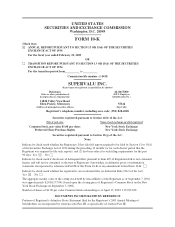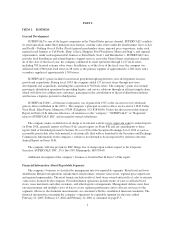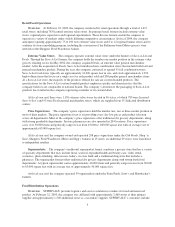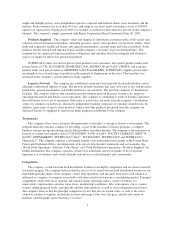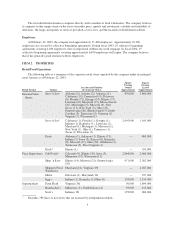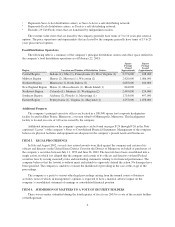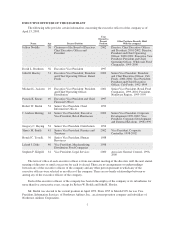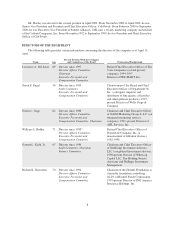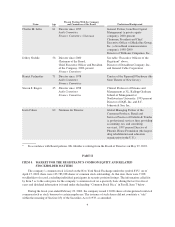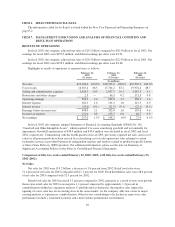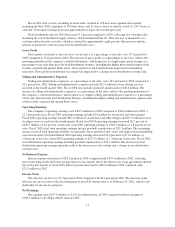Albertsons 2003 Annual Report Download - page 4
Download and view the complete annual report
Please find page 4 of the 2003 Albertsons annual report below. You can navigate through the pages in the report by either clicking on the pages listed below, or by using the keyword search tool below to find specific information within the annual report.single and multiple grocery store independent operators, regional and national chains, mass merchants and the
military. Such customers are located in 48 states, and range in size from small convenience stores to 200,000
square foot supercenters. During fiscal 2003, no customer accounted for more than two percent of the company’s
business. The company’s supply agreement with Kmart Corporation (Kmart) terminated June 30, 2001.
Products Supplied. The company offers and supplies its distribution customers with a wide variety and
selection of food and non-food products, including groceries, meats, dairy products, frozen foods, bakery, fresh
fruits and vegetables, health and beauty aids, general merchandise, seasonal items and tobacco products. Such
products include national and regional brands and the company’s own lines of private label products. The
company has no significant long-term purchase obligations and considers that it has adequate and alternative
sources of supply for most of its purchased products.
SUPERVALU offers two tiers of private label products to its customers: first quality product under such
private labels as CUB, FLAVORITE, HOME BEST, IGA, RICHFOOD and VALU CHOICE; and economy
product under such private labels as SHOPPERS VALUE and BI-RITE. SUPERVALU supplies private label
merchandise over a broad range of products in the majority of departments in the store. These products are
produced to the company’s specifications by many suppliers.
Logistics Network. The company has established a network of strategically located distribution centers
utilizing a multi-tiered logistics system. The network includes facilities that carry slow turn or fast turn groceries,
perishables, general merchandise and health and beauty care products. The network comprises 27 distribution
facilities. The company believes that its multi-tiered distribution network increases buying scale, improves
operating efficiencies and lowers cost of operations. The company is continuing to work on business initiatives
that will deliver lower cost of operations. Deliveries to retail stores are made from the company’s distribution
centers by company-owned trucks, third party independent trucking companies or customer-owned trucks. In
addition, many types of meats, dairy products, bakery and other products purchased from the company are
delivered directly by suppliers to retail stores under programs established by the company.
Trademarks
The company offers some customers the opportunity to franchise a concept or license a servicemark. This
program helps the customer compete by providing, as part of the franchise or license program, a complete
business concept, group advertising, private label products and other benefits. The company is the franchisor or
licensor of certain servicemarks such as CUB FOODS®, SAVE-A-LOT®, COUNTY MARKET®, SHOP ’N
SAVE®, NEWMARKET®, SUPERVALU®,IGA
™, FOODLAND®, SUPERVALU®and SUPERVALU
Pharmacies™. The company registers a substantial number of its trademarks/servicemarks in the United States
Patent and Trademark Office, including many of its private label product trademarks and servicemarks. See
“Retail Food Operations—Extreme Value Stores” and “Food Distribution Operations—Products Supplied” for
further information. The company considers certain of its trademarks and servicemarks to be of material
importance to its business and actively defends and enforces such trademarks and servicemarks.
Competition
The company’s retail food and food distribution businesses are highly competitive and are characterized by
low profit margins. The company believes that the success of its retail food and food distribution businesses are
dependent upon the ability of the company’s retail food operations, and the retail food stores with whom it is
affiliated as a supplier, to compete successfully with other retail food stores in a consolidating market. Principal
competition comes from local, regional and national chains operating under a variety of formats (i.e.
supercenters, supermarkets, extreme value stores, membership warehouse clubs, convenience stores, various
formats selling prepared foods, and specialty and discount retailers), as well as from independent food stores.
The company believes that the principal competitive factors that face its owned stores, as well as the stores
owned by retailers it supplies, include the location and image of the store, the price, quality and variety of
products, and the quality and consistency of service.
4

